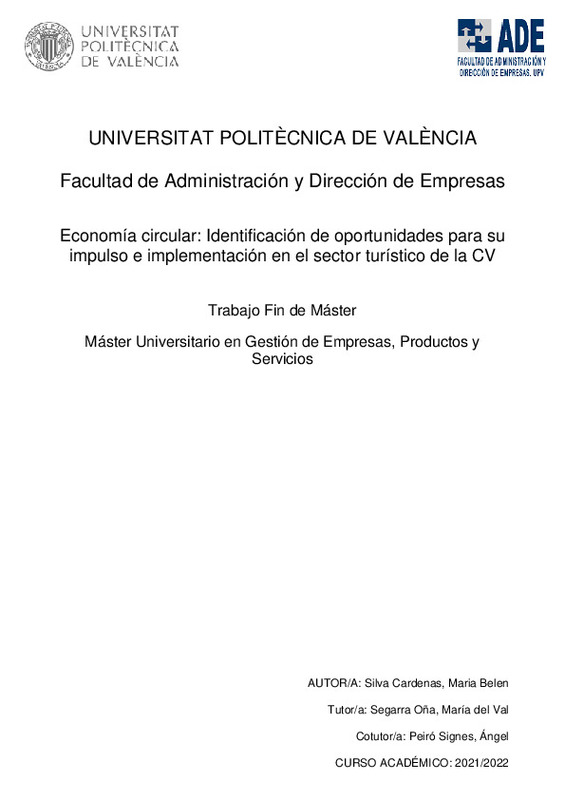|
Resumen:
|
[ES] La economía circular propone un modelo de producción y consumo en el que los
productos, materias primas y desechos se pueden utilizar de forma recurrente,
manteniéndose durante más tiempo en el sistema productivo y ...[+]
[ES] La economía circular propone un modelo de producción y consumo en el que los
productos, materias primas y desechos se pueden utilizar de forma recurrente,
manteniéndose durante más tiempo en el sistema productivo y de consumo,
generando menos residuos y reduciendo el uso de materias primas, frente al
modelo tradicional de producir usar y tirar. Desde los organismos públicos y
organizaciones gubernamentales hace años se realizan esfuerzos para promover
una transición hacia una economía más sostenible, con propuestas cada vez más
alineadas con la economía circular como, por ejemplo, “España Circular 2030.
Estrategia Española de Economía Circular” (Gobierno de España, 2020), en el que
se contempla al Sector Turístico como uno de los 5 Sectores prioritarios hacia los
cuales se dirigen los planes de acción propuestos.
Con el objetivo de incrementar la competitividad y el crecimiento del Sector
turístico aplicando los conceptos de economía circular, se identifican los objetivos
a desarrollar para conseguir una mejora de la eficiencia en la cadena de valor en
el sector turístico, aumentando su sostenibilidad y rentabilidad, fortaleciendo la
innovación y el desarrollo de nuevas tecnologías, generando un impacto positivo
a nivel social, económico y medioambiental para un desarrollo sostenible. En este
trabajo, se realizará un Audit del estado actual del Sector y se detectarán las
potencialidades de mejora en pro de la sostenibilidad, y oportunidades de
implementación en economía circular, involucrando a los distintos stakeholders
implicados y se relaciona con la literatura académica.
[-]
[EN] The circular economy proposes a production and consumption model in which
products, raw materials and waste can be used on a recurring basis, remaining in
the production and consumption system for longer, generating ...[+]
[EN] The circular economy proposes a production and consumption model in which
products, raw materials and waste can be used on a recurring basis, remaining in
the production and consumption system for longer, generating less waste and
reducing the use of raw materials, compared to the traditional model of producing
use and dispose. Public bodies and government organizations have been making
efforts for years to promote a transition towards a more sustainable economy, with
proposals that are increasingly aligned with the circular economy, such as,
"Circular Spain 2030. Spanish Circular Economy Strategy" (Government of Spain,
2020), in which the Tourism Sector is considered as one of the five priority Sectors
towards which the proposed action plans are directed.
With the aim of increasing the competitiveness and growth of the tourism sector
by applying the concepts of circular economy, the objectives to be developed are
identified to achieve an improvement in efficiency in the value chain in the tourism
sector, increasing its sustainability and profitability, strengthening innovation and
the development of new technologies, generating a positive impact at a social,
economic, and environmental level for sustainable development. In this work, an
Audit of the current state of the Sector will be conducted and the potential for
improvement in favor of sustainability, and opportunities for implementation in
circular economy will be detected, involving the different stakeholders involved
and related to the academic literature.
[-]
|







